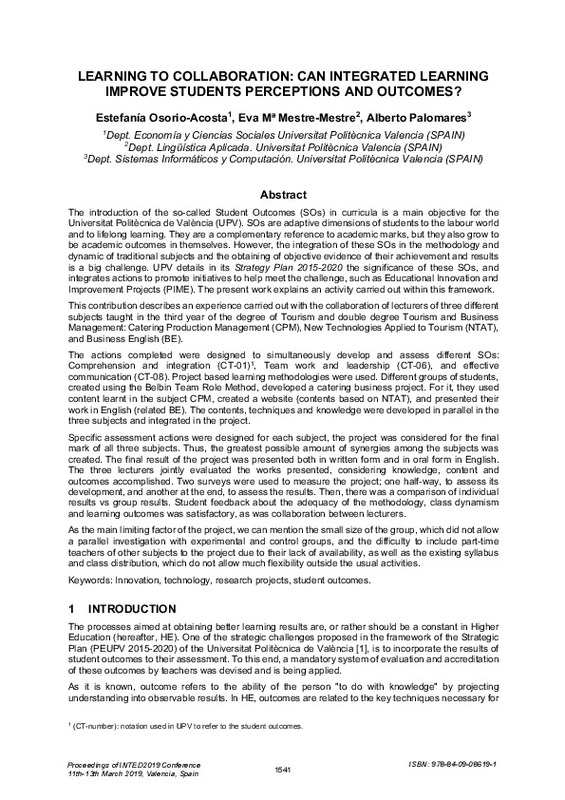JavaScript is disabled for your browser. Some features of this site may not work without it.
Buscar en RiuNet
Listar
Mi cuenta
Estadísticas
Ayuda RiuNet
Admin. UPV
Learning to collaboration: can integrated learning improve students perceptions and outcomes?
Mostrar el registro sencillo del ítem
Ficheros en el ítem
| dc.contributor.author | Osorio Acosta, Estefania
|
es_ES |
| dc.contributor.author | Mestre-Mestre, Eva M.
|
es_ES |
| dc.contributor.author | Palomares Chust, Alberto
|
es_ES |
| dc.date.accessioned | 2022-02-14T11:05:24Z | |
| dc.date.available | 2022-02-14T11:05:24Z | |
| dc.date.issued | 2019-03-13 | es_ES |
| dc.identifier.isbn | 978-84-09-08619-1 | es_ES |
| dc.identifier.issn | 2340-1079 | es_ES |
| dc.identifier.uri | http://hdl.handle.net/10251/180786 | |
| dc.description.abstract | [EN] The introduction of the so-called Student Outcomes (SOs) in curricula is a main objective for the Universitat Politècnica de València (UPV). SOs are adaptive dimensions of students to the labour world and to lifelong learning. They are a complementary reference to academic marks, but they also grow to be academic skills in themselves. However, the integration of these SOs in the methodology and dynamic of traditional subjects and the obtaining of objective evidence of their achievement and results is a big challenge. UPV details in its Strategy Plan 2015-2020 the significance of these SOs, and integrates actions to promote initiatives to help meet the challenge, such as Educational Innovation and Improvement Projects (PIME). The present work explains an activity carried out within this framework. This contribution describes an experience carried out with the collaboration of lecturers of three different subjects taught in the third year of the degree of Tourism and double degree Tourism and Business Management: Catering Production Management, New Technologies Applied to Tourism, and Business English. The actions completed were designed to simultaneously develop and assess different SOs: Comprehension and integration (CT-01) , Team work and leadership (CT-06), and effective communication (CT-08). Project based learning methodologies were used. Different groups of students, created using the Belbin Team Role Method, developed a catering business project. For it, they used content learnt in the subject Catering Production Management, created a website (contents based on New Technologies Applied to Tourism), and presented their work in English (related to Business English). The contents, techniques and knowledge were developed in parallel in the three subjects and integrated in the project. Specific assessment actions were designed for each subject, the project was considered for the final mark of all three subjects. Thus, the greatest possible amount of synergies among the subjects was created. The final result of the project was presented both in written form and in oral form in English. The three lecturers jointly evaluated the works presented, considering knowledge, content and outcomes accomplished. Two surveys were used to measure the project; one half-way, to assess its development, and another at the end, to assess the results. Then, there was a comparison of individual results vs group results. Student feedback about the adequacy of the methodology, class dynamism and learning outcomes was satisfactory, as was collaboration between lecturers. As the main limiting factor of the project, we can mention the small size of the group, which did not allow a parallel investigation with experimental and control groups, and the difficulty to include part-time teachers of other subjects to the project due to their lack of availability, as well as the existing syllabus and class distribution, which do not allow much flexibility outside the usual activities. | es_ES |
| dc.description.sponsorship | This work is supported by the projects PIME B-05/2017 & PIME B-22/2016 from UPV. | es_ES |
| dc.language | Inglés | es_ES |
| dc.publisher | IATED | es_ES |
| dc.relation.ispartof | INTED2019 Proceedings | es_ES |
| dc.rights | Reserva de todos los derechos | es_ES |
| dc.subject | Innovation | es_ES |
| dc.subject | Technology | es_ES |
| dc.subject | Research projects | es_ES |
| dc.subject | Students outcomes | es_ES |
| dc.subject.classification | FILOLOGIA INGLESA | es_ES |
| dc.subject.classification | ECONOMIA, SOCIOLOGIA Y POLITICA AGRARIA | es_ES |
| dc.subject.classification | LENGUAJES Y SISTEMAS INFORMATICOS | es_ES |
| dc.title | Learning to collaboration: can integrated learning improve students perceptions and outcomes? | es_ES |
| dc.type | Comunicación en congreso | es_ES |
| dc.type | Artículo | es_ES |
| dc.type | Capítulo de libro | es_ES |
| dc.identifier.doi | 10.21125/inted.2019.0467 | es_ES |
| dc.relation.projectID | info:eu-repo/grantAgreement/UPV//PIME%2F2016%2FB%2F22/ | es_ES |
| dc.relation.projectID | info:eu-repo/grantAgreement/UPV//PIME%2F2017%2FB%2F05/ | es_ES |
| dc.rights.accessRights | Abierto | es_ES |
| dc.contributor.affiliation | Universitat Politècnica de València. Departamento de Lingüística Aplicada - Departament de Lingüística Aplicada | es_ES |
| dc.contributor.affiliation | Universitat Politècnica de València. Departamento de Economía y Ciencias Sociales - Departament d'Economia i Ciències Socials | es_ES |
| dc.contributor.affiliation | Universitat Politècnica de València. Departamento de Sistemas Informáticos y Computación - Departament de Sistemes Informàtics i Computació | es_ES |
| dc.description.bibliographicCitation | Osorio Acosta, E.; Mestre-Mestre, EM.; Palomares Chust, A. (2019). Learning to collaboration: can integrated learning improve students perceptions and outcomes?. IATED. 1541-1549. https://doi.org/10.21125/inted.2019.0467 | es_ES |
| dc.description.accrualMethod | S | es_ES |
| dc.relation.conferencename | 13th International Technology, Education and Development Conference (INTED 2019) | es_ES |
| dc.relation.conferencedate | Marzo 11-13,2019 | es_ES |
| dc.relation.conferenceplace | Valencia, Spain | es_ES |
| dc.relation.publisherversion | https://doi.org/10.21125/inted.2019.0467 | es_ES |
| dc.description.upvformatpinicio | 1541 | es_ES |
| dc.description.upvformatpfin | 1549 | es_ES |
| dc.type.version | info:eu-repo/semantics/publishedVersion | es_ES |
| dc.relation.pasarela | S\380531 | es_ES |
| dc.contributor.funder | Universitat Politècnica de València | es_ES |








